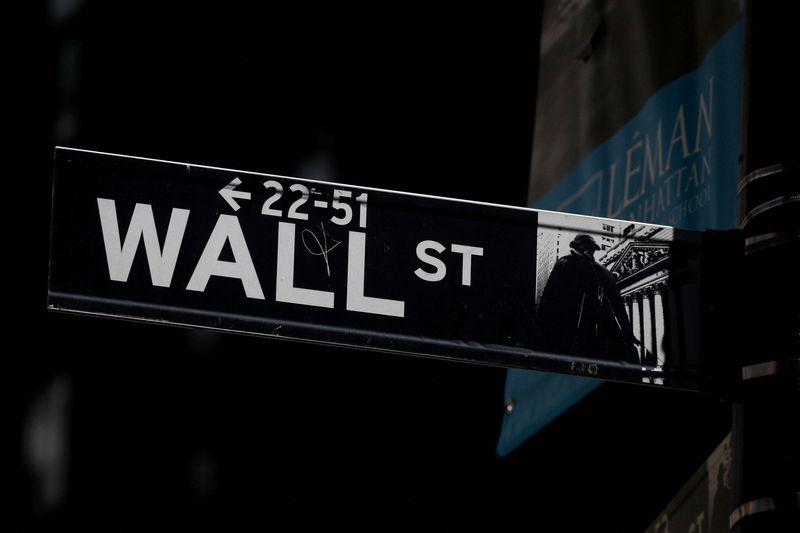Tech stocks drag Wall Street lower on growth concerns
2022.09.22 11:00
[ad_1]

© Reuters. FILE PHOTO: A Wall St. street sign is seen near the New York Stock Exchange (NYSE) in New York City, U.S., September 17, 2019. REUTERS/Brendan McDermid/File Photo
By Devik Jain and Ankika Biswas
(Reuters) – Wall Street’s main indexes fell on Thursday, extending declines for a third straight session, as investors worried that the U.S. Federal Reserve’s aggressive approach to rein in inflation could trigger a recession.
Ten of the 11 major S&P sectors declined in early trading, led by industrials and consumer discretionary stocks..
Weighing on the S&P 500 and the Nasdaq, shares of megacap technology and growth companies such as Apple Inc (NASDAQ:), Amazon.com Inc (NASDAQ:), Tesla (NASDAQ:) Inc and Nvidia (NASDAQ:) Corp fell between 1.0% and 3.6% as benchmark U.S. Treasury yields hit an 11-year high. [US/]
Rising yields weigh particularly on valuations of companies in the technology sector, which have high expected future earnings and have significant weightage on indexes such as the S&P 500.
The S&P 500 tech sector has slumped over 27% so far this year as compared to a 21% decline in the .
“The higher interest rates imposed yesterday and the more hawkish tone delivered by the Fed will weigh on stocks in general and likely more on rate-sensitive sectors,” said Sam Stovall, chief investment strategist at CFRA Research.
“I definitely see the market testing the June lows and there is an increased likelihood that new lows will be set as indicated by the rise in the two-year yield, and the widening of the inversion of the two-year and 10-year yield curve.”
The S&P 500 is now 3.3% away from its mid-June low, its weakest point of the year.
The U.S. central bank lifted rates by an expected 75 basis points on Wednesday and signaled that its policy rate would rise by 4.4% by year end and top out at 4.6% by the end of 2023, a steeper and longer trajectory than markets had priced in.
Investors fear the aggressive path could add to volatility in stocks and bonds in a year that has already seen bear markets in both asset classes and could potentially cause an economic downturn.
Goldman Sachs (NYSE:), Barclays (LON:) and a bunch of investment banks have raised their estimates for U.S. policy rates following Fed’s hawkish message, with Societe Generale (OTC:) economists also projecting a mild recession in early 2024.
“There are a lot of risks at this level, but the Fed has decided that they’re going to go the Volcker way, which is to stay the course and try to nip it now,” said Eric Schiffer, chief executive of PE firm Patriarch Organization in California.
Data on Thursday showed the number of Americans filing new claims for unemployment benefits increased moderately last week, suggesting the labor market remains tight.
At 10:05 a.m. ET, the was down 154.91 points, or 0.51%, at 30,028.87, the S&P 500 was down 29.33 points, or 0.77%, at 3,760.60, and the was down 126.41 points, or 1.13%, at 11,093.79.
Recent dismal outlooks from companies including FedEx Corp (NYSE:) and Ford Motor (NYSE:) Co have also raised concerns about the health of corporate America.
Darden Restaurants Inc (NYSE:) fell 4.1% after the Olive Garden parent reported downbeat first-quarter sales.
Salesforce (NYSE:) Inc rose 2% after the enterprise software company set its fiscal year 2026 revenue target at $50 billion.
Eli Lilly (NYSE:) and Co gained 3.2% after the U.S. FDA approved the company’s drug Retevmo for treatment of advanced tumor and non-small-cell lung cancers.
Declining issues outnumbered advancers for a 5.02-to-1 ratio on the NYSE and a 4.19-to-1 ratio on the Nasdaq.
The S&P index recorded no new 52-week high and 111 new lows, while the Nasdaq recorded 8 new highs and 438 new lows.
[ad_2]
Source link








